|
|
|
Sort Order |
|
|
|
Items / Page
|
|
|
|
|
|
|
| Srl | Item |
| 1 |
ID:
185518
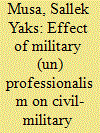

|
|
|
|
|
| Summary/Abstract |
The focus of this study is on the effect of military (un)professionalism on civil-military relations and citizens’ security in Nigeria. To sketch the context, the article provides a brief background on the nature of armed conflict, which necessitated the deployment of the military in internal operations. Following this is a brief description of the extent and nature of military abuse, which strains civil-military relations. Using the principles of what constitutes military professionalism, the study shows that the conduct of the Nigerian military, together with the lack of civil control undermines internal security operations and has eroded trust in the armed forces. The influence on civil-military relations is analysed, with reference to a qualitative study conducted among civilians affected by military abuse in Plateau State. The findings show that the unprofessionalism of the Nigerian military undermines military effectiveness, civil-military relations, and exacerbates the insecurity of citizens.
|
|
|
|
|
|
|
|
|
|
|
|
|
|
|
|
| 2 |
ID:
185517
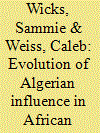

|
|
|
|
|
| Summary/Abstract |
Algerian leadership was once instrumental in organising and fomenting jihad in North Africa and the Sahel. Alongside leadership decapitations, counter-terrorism crackdowns, and a ‘Sahelian shift’ following the influx of Sahelian members, Algerian influence has since significantly waned. Today, Algerian influence is mainly seen in cautionary tales against extremism and infighting. In contrast, few Algerian jihadists still play a role within the overall hierarchy of al-Qaeda's North African and Sahelian branches. As such, it is ultimately a new generation – a non-Algerian generation – that is leading the jihadist charge in northern Africa and the Sahel. However, although diminished, Algerian leadership remains persistently valuable to al-Qaeda’s senior leadership due to their strategic utilitarian view.
|
|
|
|
|
|
|
|
|
|
|
|
|
|
|
|
| 3 |
ID:
185515


|
|
|
|
|
| Summary/Abstract |
Welcome to this edition of the African Security Review. In this issue, our authors offer a bouquet of contributions that highlight the centrality of human security from several perspectives. The real and potential harm of historical religions and ideologies that intentionally seek to harm other people, both physically and mentally, requires counter-narratives that emphasise the vital importance of human rights and other democratic freedoms. The importance of the projection of soft power in the political economy of what remains a liberal world, without importing or exporting regional geopolitical tensions, is such a counter-narrative to the violent nature of hard-power projection. What emerges from the work of our authors is the requirement for civil oversight, professionalism and protection of citizens in the unfortunate cases where the state decides to execute its mandate to wield the sword.
|
|
|
|
|
|
|
|
|
|
|
|
|
|
|
|
| 4 |
ID:
185516
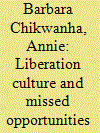

|
|
|
|
|
| Summary/Abstract |
This article analyses the roles of key liberation war actors in shaping the new security regime in Zimbabwe. This is done through analysing the trajectory of the security sector reforms (SSR) and the missed opportunities for transformation since 1980. The post 1980 security establishment was dominated by the logistical posturing of the liberation war security structures. This allowed for the infusion of the exile formed liberation culture values that evolved during war-time governance practices. SSR in the country remained deliberately skewed towards technical capacity building, without attempts to align the security provision with the universal human rights doctrine. The findings show that the partisan oriented SSR approach has contributed to the elusive human security paradigm in the country.
|
|
|
|
|
|
|
|
|
|
|
|
|
|
|
|
| 5 |
ID:
185519
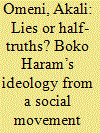

|
|
|
|
|
| Summary/Abstract |
Using Social Movement Theory (SMT) as a methodological framework and explicitly employing the core SMT concepts of political opportunism and framing, this paper seeks to examine Boko Haram's use of discourse in activism. As a rarely employed research method within the Boko Haram literature, SMT holds explanatory power around the movement's approach to transforming motivation potential into actual mobilisation via frame resonance. Focusing on the application of framing within (interpreted) sermons, lectures and exhortations by both Muhammad Yusuf and Abubakar Shekau as former substantive leaders of Boko Haram, this paper unpacks the discourse of Boko Haram's ideology. The paper shows that this ideology, which contrasts the softened core of the Salafist/Wahhabi doctrines from which Boko Haram broke away, relies on problematic interpretations of Qur’ānic exegesis and political thought as both relate to faith and governance in northern Nigeria. One policy recommendation to emerge from this study is that counter-narratives to Boko Haram's ideology should highlight not just why but also how the group's rhetoric employs lies and half-truths in an attempt to rationalise its activism; despite what appears to be an adherence to Qur’ānic exegesis, in making its claims.
|
|
|
|
|
|
|
|
|
|
|
|
|
|
|
|
| 6 |
ID:
185520
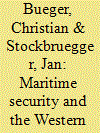

|
|
|
|
|
| Summary/Abstract |
Ten years after the last large scale piracy attacks in the Western Indian Ocean, other maritime crimes such as illicit fishing and maritime smuggling have emerged. The spill over of conflicts in Yemen and Mozambique and maritime grey-zone activities have also become major maritime security issues. Yet, perhaps the most worrying – though largely underappreciated – trend is the surge of naval activity and strategic competition in the region. This is a major dilemma for the region: The region relies on external military actors to protect vital shipping lanes, but the presence of these actors also risks importing geopolitical tensions that could undermine regional maritime stability. How can the region address these maritime insecurities and the evolving militarisation dilemma? We investigate the regional maritime security architecture to identify institutions that can help the region manage the militarisation dilemma. We argue that only the Shared Awareness and Deconfliction (SHADE) mechanism and the Contact Group on Piracy off the Coast of Somalia (CGPCS) can help mitigate geopolitical competition in the region. Preparing these mechanisms to deal with the militarisation dilemma will be vital for the long-term prosperity of the Western India Ocean.
|
|
|
|
|
|
|
|
|
|
|
|
|
|
|
|
| 7 |
ID:
185521
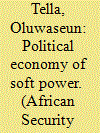

|
|
|
|
|
| Summary/Abstract |
In recent times, the concept of soft power has emerged as one of the most important terms in international relations. It has been applied to various aspects of statecraft from democracy promotion to peace-making, cultural diplomacy, economic diplomacy, counter-terrorism and disaster management, to name but a few. However, there is a dearth of literature on the political economy of soft power. Given that economic interests substantially drive states’ foreign policies, it is surprising that this aspect of states’ power of attraction has been neglected. It is against this backdrop that this article examines the political economy of soft power focusing on South Africa. In doing so, it engages South Africa’s neo-liberal order and the influx of its multinational companies in Africa and submits that despite the criticism it encounters in this regard, Pretoria has exercised soft power within the purview of political economy.
|
|
|
|
|
|
|
|
|
|
|
|
|
|
|
|
| 8 |
ID:
185522
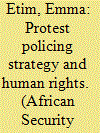

|
|
|
|
|
| Summary/Abstract |
In this study, we adopted the negotiation management model (NMM) and the elaborated social identity model (ESIM) to assess and match with global best practices the conduct of personnel of the Nigerian Police Force during the End SARS protest. We used the descriptive mixed-method research design to answer the research questions after taking stock of some achievements recorded by SARS and critical factors that led to the protest. We discovered, among others, that the Nigerian Police Force lacks a functional public complaint mechanism through which members of the society can express their grievances concerning the activities of personnel of the force. Further, the orthodox belief that a dominant show of force would compel protesters to comply with government directives failed during the End SARS protest. Our finding validates H. F. Guggenheim Foundation Guide that the police's response to peaceful gatherings as if they were riots and their failure to prevent a violent development at an early stage would lead to the degeneration of protests. The study makes recommendations on achieving a peaceful and well-managed protest if a demonstration becomes inevitable.
|
|
|
|
|
|
|
|
|
|
|
|
|
|
|
|
|
|
|
|
|